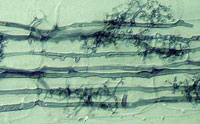Similar limb designs develop through very different pathways and point to common design. …read more Read more here: creation.com
These study results are particularly interesting because they utterly defy all predictions in the evolutionary paradigm—literally turning it on its head and showing that it is a fallible model of human origins. More… …read more Read more here: icr.org
Presumably an extraterrestrial object struck Mars and “launched” rock fragments into space, and those fragments became Martian meteorites and eventually arrived here on Earth. More… …read more Read more here: icr.org
The cratering pattern on the asteroid Vesta presents a ‘dating’ conundrum. …read more Read more here: creation.com
Evolutionists say birds evolved from dinosaurs with flight-ready brains. …read more Read more here: AIG Daily
By Ken Ham Recently, I saw a headline that caught my eye. The secular journal Nature published an article titled “Genetic Adam and Eve did not live too far apart in time.” Now, secularists (and even some Christians) propose the idea that there was “Y-chromosome Adam” and “mitochondrial Eve”—basically the supposed ancestors of human beings. According to the article in Nature, secular scientists have redated when they believe these two ancestors existed. But you know, these evolutionary scientists have the entirely wrong starting point on this issue, which the opening line of the article makes clear: The Book of Genesis [More]
Fiery catastrophe greater in the past. …read more Read more here: creation.com
Amazingly, the plants that were not under insect attack themselves, but connected to a victimized plant by the underground fungal network, began to produce a defensive chemical response in their cells. More… …read more Read more here: icr.org
Danny R. Faulkner, AiG–U.S., lays groundwork for the beginning of a new solution to the light travel time problem. …read more Read more here: AIG Daily
A recent collaboration of scientists found that forests “have become dramatically more efficient in how they use water,” and the key to that efficiency was an uptick in atmospheric carbon dioxide. More… …read more Read more here: icr.org
Long-age geologists will not accept a radiometric date unless it matches their pre-existing expectations. …read more Read more here: creation.com
Is man an animal? A mammal? A primate? Or something more … …read more Read more here: creation.com
Is the pig’s love of wallowing in mud a legacy of having evolved in some muddy pond, billions of years ago? …read more Read more here: creation.com
One of the most noteworthy aspects of this vlincRNA research paper was the positive attitude of the scientists reflected in their premise of looking for purpose and function in the genome. More… …read more Read more here: icr.org
These supposedly primitive fish—purported to represent the advent of jaw evolution—occur fully formed, with no hint of the evolutionary transition that evolutionists had for so long imagined. More… …read more Read more here: icr.org
And other myths about the genetics and development of the sexes …read more Read more here: creation.com
Unexpected features of the Cosmic Background Radiation are hard to explain in a big bang framework. …read more Read more here: creation.com
How radioactive dating confuses the situation …read more Read more here: creation.com
Does a peek “into the minds of birds” provide a peek into the origin of ours? …read more Read more here: AIG Daily
Leading paleoanthropologist Bernard Wood admits human evolutionary origins are ‘frustratingly unclear’. …read more Read more here: creation.com
In chapter 10 of his Origin of Species, Charles Darwin made a prediction: “No organism wholly soft can be preserved.” He’s been proven wrong-big time. Read more here: creation.com
Evolution of live-bearing lizards from lizards makes the news. …read more Read more here: AIG Daily
Evolving people? . . . Or just natural selection in action? …read more Read more here: AIG Daily
Those who say dinosaurs died out millions of years ago never expected to find the real skin of a hadrosaur, which now might be able to tell us about their colour. …read more Read more here: creation.com
A memorial to Noah’s Flood. …read more Read more here: creation.com
This amber find is remarkably rare because it not only preserves the entire body of a vertebrate, it also preserves some of that creature's original soft tissues. More… …read more Read more here: icr.org
The latest astronomical reports bring no joy, only increased bewilderment, to scientists who presume the Earth and its moon are billions of years old. …read more Read more here: creation.com



















![Sunday School Medley [Live] Sunday School Medley [Live]](http://img.youtube.com/vi/iQ4CBCt2uHI/0.jpg)



























